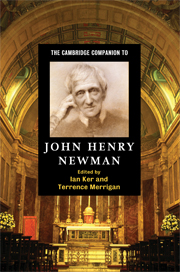6 - Development of doctrine
Published online by Cambridge University Press: 28 May 2009
Summary
Having decided to become a Roman Catholic, John Henry Newman laid aside his unfinished Essay on the Development of Christian Doctrine. Neither he nor anyone in the Church knew that he had just articulated 'the classic discussion of doctrinal development' and fixed 'the almost inevitable starting point for an investigation of development of doctrine'. Newman's Essay - and he considered it to be just that - enabled him to find intellectual warrant for his departure from Canterbury for Rome. The Essay possesses 'continuing relevance' for theology because Newman both poignantly formulated the problem created by the collision of dogmatic Christianity with the historical consciousness that impressed itself upon Western culture in the nineteenth century, and advanced 'an hypothesis' towards an explanation. In the estimation of Avery Dulles, the Essay remains unsurpassed in influence and 'in depth and thoroughness' among writings on development of doctrine. The Essay framed subsequent confrontations with the problem; indeed the compatibility between Newman's Essay and the understanding of doctrinal development espoused by the Second Vatican Council is conspicuous. Newman's understanding of development was not entirely without precedent. Some patristic authors, most strikingly St Vincent of Lérins, came near the notion almost asymptotically but, like the medieval theologians who later drew near the theme in some way, they engaged in nothing resembling systematic reflection on it. Scholastic and neoscholastic theologians cast the problem, to the limited extent that they perceived it, in logical terms, failing thereby to attain to the crux of the problem posed by the flux of history. In 1825 Johann Adam Möhler of the Catholic Tübingen School published Die Einheit in der Kirche, which approached the issue, yet neither this nor his more famous Symbolik of 1832 contended directly with the problem of history's clash with Catholic dogma's claim to immutability.
- Type
- Chapter
- Information
- The Cambridge Companion to John Henry Newman , pp. 118 - 136Publisher: Cambridge University PressPrint publication year: 2009
- 3
- Cited by

